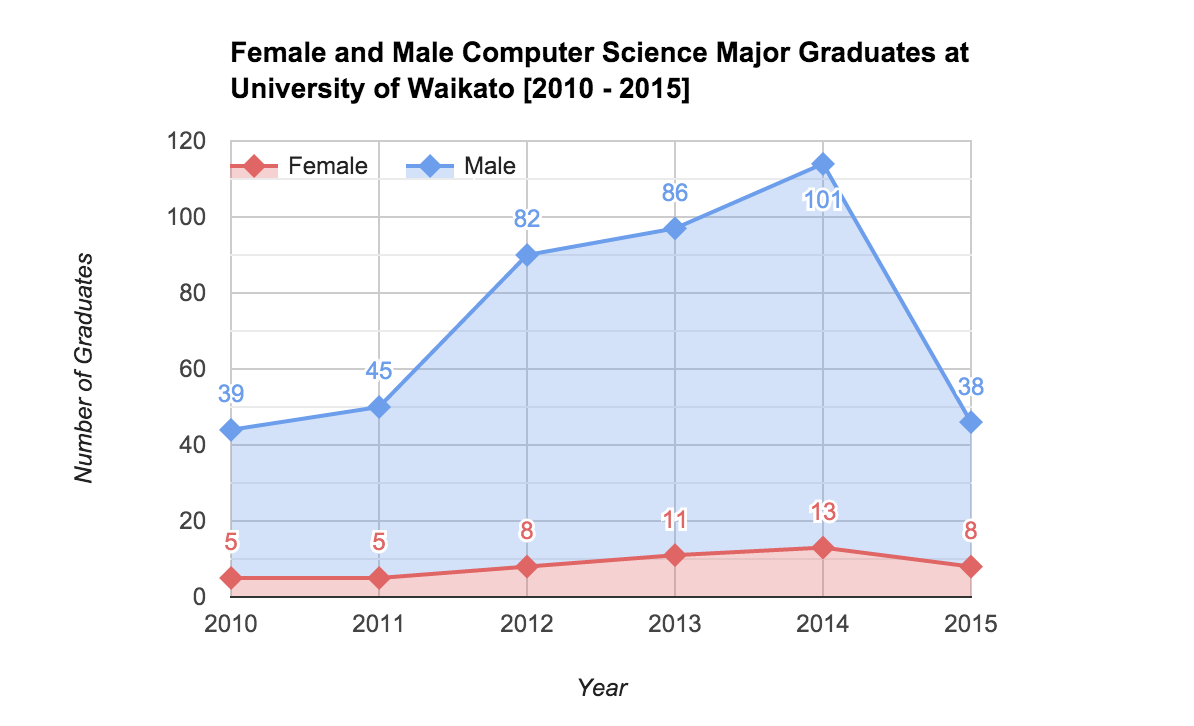Summer Research Project Update No.1
Hello, this is my first update of my research!
I am looking at research surrounding women in computer science. At the end of my summer research I plan to detail some practical steps that the university can take to become more supportive to women in CS.
There are several outcomes that are desirous, and if any one of those outcomes is realised then I shall deem this research project a success.
For example:
-
The number of female enrolments in the faculty increase over the next five years
-
More research on this topic is conducted at University of Waikato
-
Any of the recommendations I make in the final report are considered and implemented
-
Metrics are collected and used to measure progress and draw interest to the problem
I started by reading Why are There so Few Female Computer Scientists - Ellen Spertus (1991)
This is an extensive overview of the challenges facing women in computer science. Even though this research was conducted a while ago, I believe it is still relevant as many of the issues discussed remain difficulties now. In another update I will highlight some of the things I have found interesting in reading this document.
Spertus’ dissertation is broken down into these sections:
- Societal Factors
- The Masculine Environment
- Gendered Language
- Problems with Solutions
- Recommendations and conclusions
I plan to use this as a rough template for categorising my research. I want to particularly focus on Problems with Solutions and Recommendations.
People
Female Department Staff
I had a meeting with three female lecturers which was revealing of some of the difficulties and obstacles they face in the department. I got a good idea of what has been tried in the past at University of Waikato and the effects of those efforts.
There was a conference for women run at Waikato University for three years in a row. It was popular and it helped the women to form a strong localised support group. Unfortunately running this took a huge amount of time and effort and the organisers were soon exhausted. Although this event was beneficial to the attendees, it was an unsustainable venture.
- Some attendees couldn’t make it because of requirements at home
- Making allowance for cultural differences was complex and time consuming
- Organiser’s felt it that it impeded their career progress
There was a day-long event held at the University of Waikato where girls were gathered from local schools. They participated in various activities and talks to encourage study in STEM subjects. This event took a lot of effort and time to organise. Unfortunately this didn’t eventuate into more female enrolments in computer science. The theory for this outcome is that teachers were glad to have time away from teaching and students to be out of class and thus the event wasn’t taken seriously. This event had a high cost and no return.
Me
I have organised Ladies’ Lunches and I believed them to be unsuccessful. On my part I was already over committed and organising get-togethers was really beyond my capabilities at the time. The gatherings require a focus - it is awkward to turn up and sit around without a point of discussion.
However, I think that it would be valuable to try to organise these type of gatherings again, and some of the female students have taken an interest in running them (which is great!). It has proven to be successful at other universities (a good example is University of Canterbury where female enrolment in computer science is now around 25%)
Running such events also improves the student’s eligibility to apply for scholarships such as Google’s Anita Borg Scholarship and scholarships to attend Grace Hopper Celebration of Women in Computing. In research I have read so far, winning scholarships and attending conferences is a great benefit to women studying CS. It boosts their confidence, comradeship and sense of belonging in the field.
In my recommendations I plan to discuss ideas on how to easily host get-togethers for women in tech - I know that for them to be continued, the barrier to organising them must be low and take minimal effort and time.
Tony McGregor
Tony McG looks at data of students/enrolments/grades. He will be sending me information on numbers of females in classes and grade distributions. He is also currently working on a project to try and identify at-risk students. We discussed the importance of students getting help and being supported. We also discussed ideas around surveying students and having metrics in which we could track progress.
Numbers at Waikato
The following graph is takes the number of graduates from BSc, BSc(TECH), BCMS, BCMS(HONS) doing computer science majors

(Please note that I believe the number for 2015 is from mid-year graduations, and doesn’t include the total for 2015)